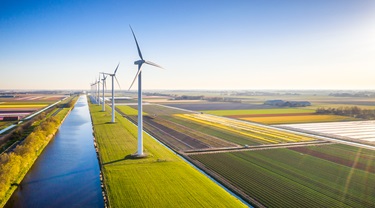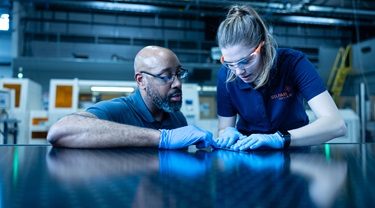
Need for speed: Canadian cleantech in race to decarbonization
Author details
Karen Turner
Senior international trade editor
For Jeff Keats, home will always be Canada’s East Coast, but when it comes to climate change, he’s a firm believer that worldwide collaboration is needed now to accelerate decarbonization for the future.
“I view the change to climate like I view healthy living and longevity. While I want to enjoy the present, I also want to have a long, healthy and fun life,” says Keats, Export Development Canada’s (EDC) new national cleantech lead, ecosystems and market intelligence.

“Achieving climate goals isn’t a one-size-fits-all, nor will it be the responsibility of a handful of parties. We need to take an all-hands-on-deck approach,” says the long-term EDC employee, who started at the Crown corporation in 2006 as part of a university recruitment program, progressively taking on more challenging roles throughout his career.
“I’m passionate about Canadian cleantech and value the benefits of collaboration and partnership, but I’m concerned that we aren’t moving fast enough in Canada or globally.”
Born in Halifax, NS, and raised in Newfoundland, Keats has a master’s degree in finance and international business from Newfoundland’s Memorial University and spent a semester studying in Germany. He also has a bachelor’s degree in business administration from Acadia University in Nova Scotia.
With his deep, booming voice and witty manner, he could easily be mistaken for a radio announcer or TV broadcaster.
You should also check out
Rapidly growing sector remains resilient despite turbulent headwinds
In his new role, Keats joined outgoing cleantech lead, Lynn Côté, at this year’s EDC Cleantech Export Week (CEW), held Oct. 30-Nov. 6. He describes the mix of live and virtual events as “a fantastic week of learning, especially for me.”
We asked him to share his five key takeaways:
1. Canada has made impressive strides in cleantech over the past decade, but there’s amazing potential ahead—both domestically and globally.
Carl Burlock, EDC’s executive vice-president and chief business officer, kicked off the live event in Ottawa on Oct. 30 with a powerful forecast: Globally, the cleantech industry is expected to reach US$26 trillion over the next 10 years, and by 2030, there will be 10 times more electric vehicles (EVs) on the road.
This surge in EVs, he pointed out, will provide “a great opportunity to build out Canada’s critical minerals” to help accelerate decarbonization.
The International Energy Agency (IEA) also projects that by 2030—in just a little over six years—renewable energy will account for nearly half of the world’s electric supply.
2. To hit our climate goals, we need to do MORE and do it FASTER!
The need for speed is paramount because 1.2 billion people are expected to be displaced by climate issues.
Martin Beaudoin Nadeau, founder of Viridis Terra, a Quebec-based climate tech company that revitalizes and restores degraded lands worldwide, says to scale faster, we need “patient investors” willing to support projects now for future environmental gains.
“If we don’t take a risk, it’s going to be very, very difficult for future generations,” the forest engineer lamented. EDC selected Viridis Terra as one of this year’s leading innovators to watch in Canada’s fast-growing cleantech sector.
Other factors causing a lag:
- There’s more uncertainty now in the ecosystem than there has been in many years due to:
o The long-term viability of certain policy paths if government changes
o The challenging combination of inflation and high interest rates
o Stronger incentives in markets such as the United States (U.S.) and European Union (EU) pulling investments into those markets
o The execution time for Canadian government programs to be rolled out. For example, the Investment Tax Credits (ITCs) are still not defined at a level where companies can confidently make investment decisions.
o The Inflation Reduction Act in the United States provides tax incentives to grow cleantech in the U.S., making it difficult for Canadian companies to compete. As a result, an increasing number of our cleantech startups and innovative thinkers are migrating to U.S. markets and beyond.
o A gap in late-stage and seed funding
3. Partnerships are key.
Scaling technologies to accelerate decarbonization depends on co-ordination and participation across all levels of government, financial institutions, and public and private partnerships, including:
- Early and late-stage funding with a mix of grants, equity and lending
- Programs such Natural Resource Canada’s (NRCan) Low Carbon Fuel Fund providing needed capital for projects
- Canada Infrastructure Bank (CIB) and other partners providing concessional financing alongside the private sector to accelerate the development of infrastructure projects
- Policy support and implementation to help maintain cost competitiveness as firms transition to cleaner production processes, especially in reducing emissions from traditional, hard-to-abate industrial and manufacturing sectors. From a trade perspective, policy support helps reduce the cost of adopting low-carbon technologies, which potentially positions them at an advantage over global firms that don’t adopt cleaner or green technologies.
4. We need to look beyond our borders.
The Canadian market is only so large. Cleantech companies wanting to scale need to look outside Canada. Globally, Canada is well-known for its carbon tech, energy solutions and innovation, but there’s a gap domestically.
Growth in our cleantech sector will require selling to other markets, but first, we need successful adoption in Canada.
Maintaining competitiveness with other countries will be key as we look to drive cleantech exports and diversify our market exposure. This can only happen if Canadian governments, corporations, small- to medium-sized enterprises (SMEs) and investors embrace Canadian cleantech solutions.
You should also check out
Get the answers you need to make informed business decisions
5. We can accelerate decarbonization by leveraging new and emerging Canadian cleantech.
- Canada has many strengths in existing technologies and sustainable products, including EVs, heat pumps/energy efficiency and renewable natural gas (RNG). Canada needs to adopt what’s been proven.
- Offshore wind projects can also help expand Canadian renewable energy expertise to more new markets.
- On the flip side, more investment is needed in emerging sectors such as carbon capture, utilization and storage (CCUS), and hydrogen.
It won’t be just one technology that leads us to success. Domestic adoption, collaboration, policy frameworks and additional funding can all help make these goals a reality.
By the numbers
$29 billion How much EDC has provided to Canadian cleantech companies since 2012
3.7% The percentage cleantech companies contribute to Canada’s GDP
188,000 The number of Canadians employed in the cleantech sector
$51 billion How much venture investments in U.S. dollars global cleantech attracted in 2022
$1.7 trillion The amount in U.S. dollars the International Energy Agency (IEA) expects will be invested globally in clean technologies in 2023


















